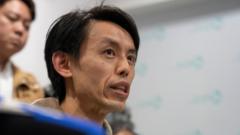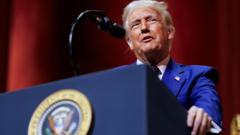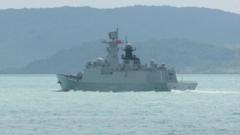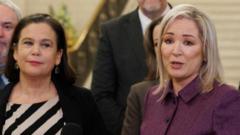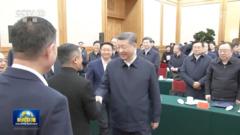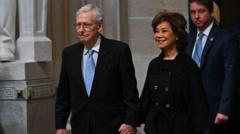In his second term, President Trump is focusing on foreign policy adjustments through trade negotiations and high-profile meetings with leaders like Netanyahu and Ishiba, signaling a new direction for U.S. relations and strategies.
Trump's Second Term: Strong Moves in Trade and Foreign Policy

Trump's Second Term: Strong Moves in Trade and Foreign Policy
President Trump is making significant changes in international trade and relations, hosting foreign leaders and negotiating key agreements.
Three weeks after commencing his second term, President Donald Trump is actively reshaping the United States' foreign relations and trade landscape. He has recently reached temporary tariff relief deals with Mexico and Canada, while preparing to welcome Israeli Prime Minister Benjamin Netanyahu and Japanese Prime Minister Shigeru Ishiba to the White House later this week. These diplomatic interactions reflect a recalibration of U.S. economic strategies and foreign policies in Trump's new administration.
Trump's aggressive trade approach is illustrated by his latest agreement, which includes a 30-day postponement of tariffs in exchange for increased efforts by both Mexico and Canada to address concerns over illegal immigration and drug trafficking. This reflects Trump’s signature negotiation techniques, leveraging economic incentives to secure national security commitments.
As trade tensions with China persist, the Trump administration is poised to intensify negotiations addressing tariffs, manufacturing supremacy, and intellectual property theft in the near future. China's relationship with the U.S. remains a crucial aspect of Trump's broader economic strategy.
The upcoming meeting with Netanyahu is notable as it marks Trump's first official bilateral engagement since his inauguration. Richard Goldberg, a senior adviser, emphasized the importance of this meeting, viewing it as a message of unity directed at adversaries such as Iran. Critics of the previous administration argued that U.S. distancing from Israel under Biden emboldened Tehran, but Trump's reaffirmation of the U.S.-Israel alliance aims to counter this perception during a time of increased tensions in the region.
The American Israel Public Affairs Committee (AIPAC) reinforced this message, highlighting Netanyahu's visit as indicative of the essential nature of U.S.-Israel relations, particularly in the context of Iran's influence. This meeting occurs during a fragile ceasefire between Israel and Hamas, which emerged after the October 7 terrorist attacks. The ceasefire, developed under the Biden administration with contributions from Trump's transition team, is pivotal as Israel and Hamas work through a complicated peace process.
As the ceasefire agreement approaches its expiration on February 18, concerns mount over its sustainability. The agreement's first phase entailed crucial elements like the release of Israeli hostages, prisoner exchanges, and humanitarian aid increases, whereas the subsequent phases aim for further hostages' release and long-term conflict resolution.
Trump's strong support for Israel presents a challenge to his administration, as it seeks to steady relations in a tempestuous Middle East. His forthcoming meeting with Japanese Prime Minister Ishiba demonstrates a clear focus on enhancing Pacific alliances, particularly as Japan plays an integral role in the U.S. strategy to counterbalance China's expanding influence. Discussion topics likely to feature in this meeting will include military collaboration and trade agreements.
Overall, Trump's return to the presidency indicates a significant shift in U.S. foreign policy. Encounters with leaders like Netanyahu and Ishiba, combined with ongoing trade negotiations, establish a direction for American leadership on the global stage over the next four years.



